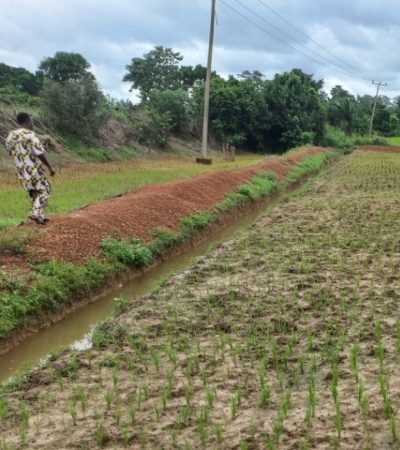Korka Diaw, who chairs a women’s rice production and processing group in Senegal’s River Valley, is an ambitious and organized leader – and she means business.
Diaw’s group, Malal Yero Gueye, began as a tontine – or traditional women’s savings group – in 1991. The group decided in 1999 to try its hand at cultivating rice, and borrowed 1.5 hectares of land from the local mayor’s office to do so.
Today, Malal Yero has 26 members – 18 of whom are women – and at least 40 workers that the group employs seasonally. Over the years, under Diaw’s leadership, Malal Yero has acquired 100 hectares of land, and its processing center is still the only one of its kind in the area, with a daily production capacity of up to 16 tons. In addition to processing their own rice, the women of Malal Yero strategically began offering milling services to other customers and supporting their community by buying rice from other growers to process themselves.
As of last year, Malal Yero’s land was yielding an average of five to six tons of rice per hectare. Like much of the potentially fertile River Valley region, the group’s land was poorly developed, and more than half of it was not being used for rice cultivation. That is quickly changing thanks to Diaw’s continued leadership and a $182,000 Feed the Future grant from the U.S. African Development Foundation (USADF) awarded to Malal Yero to help the group reach its full potential in agriculture.
Over the next four years, Malal Yero will use this grant money to rehabilitate existing rice fields; construct a 400 ton storage warehouse so there is enough rice to eat throughout the year; purchase a tractor, motor pump and agricultural inputs such as seeds and fertilizer; and provide training to members in technical, financial and organizational management.
With Diaw at the helm, Malal Yero has already exceeded expectations since being awarded the grant in June 2013. While the average new USADF grantee tends to disburse funds slowly, making three or four purchases in its first year, Malal Yero has wasted no time investing the funds in the business, making 11 purchases within its first six months as a grantee for new equipment, warehouse construction, training, marketing and other needs. The group already has contracts with the World Food Program, among others, and is taking advantage of market segmentation, selling four distinct rice variations. At a current revenue of nearly $153,000, Malal Yero is well on its way to surpassing its first year revenue target of $212,000.
“Last year, we were sitting in a hut,” says Diaw. “Today, we are in a functional office. We can purchase more paddy rice and our rice mill is fully occupied.”
Diaw and her group are an example of how investing in women can be one of the most effective ways to combat hunger and poverty in agricultural communities around the world. With her continued vision and support from Feed the Future, Malal Yero is solidifying its place in the community as one of the River Valley’s most successful agricultural enterprises.
Under Feed the Future, USADF makes targeted investments through direct grants to Africans to expand economic activities in rural communities and build the capacity of smallholders employed in the agriculture sector, laying the groundwork for better nutrition and food security among increasing numbers of men, women and children across Africa.


